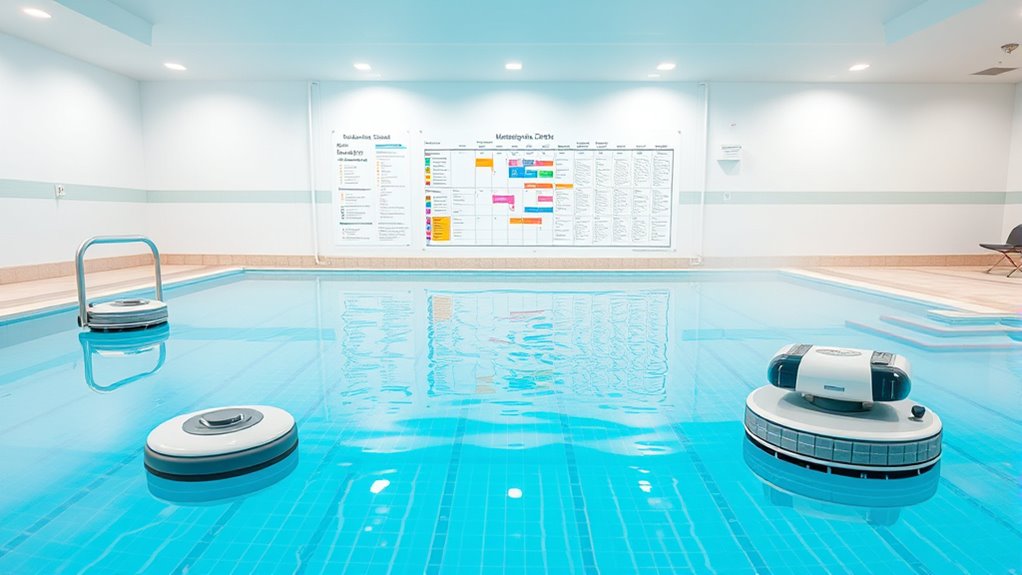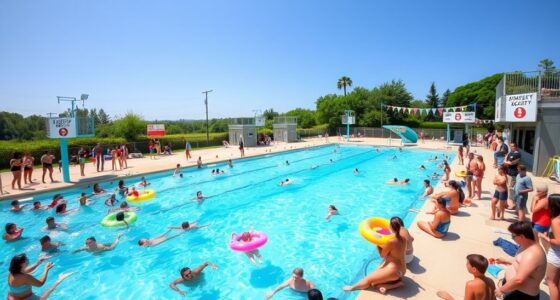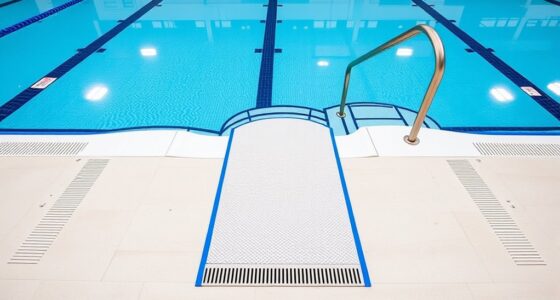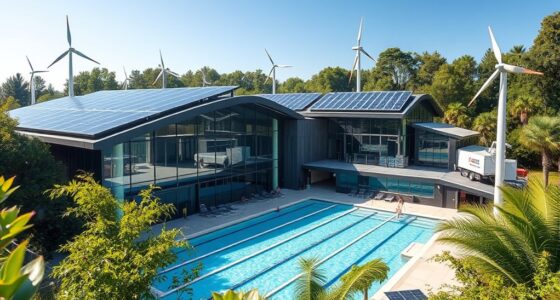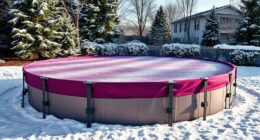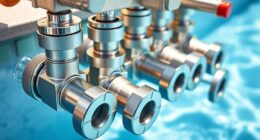To keep your commercial pool safe, establish a thorough maintenance schedule that includes daily water testing for pH and chlorine levels, regular equipment calibration, weekly cleaning and filter checks, and monthly inspections of mechanical systems and safety devices. Consistent upkeep prevents algae growth, bacteria buildup, and equipment failures. Staying on top of these tasks ensures water quality and safety compliance. Continue exploring to discover detailed schedules and tips to streamline your facility’s maintenance routine.
Key Takeaways
- Implement daily water testing for pH, chlorine, and other chemicals to ensure safety and water quality.
- Regularly calibrate monitoring equipment to maintain accurate chemical readings and prevent safety hazards.
- Conduct routine inspections and cleaning of filters, skimmers, and mechanical systems to ensure proper operation.
- Schedule weekly water testing, chemical adjustments, and filter maintenance to sustain balanced water chemistry.
- Perform monthly deep-cleaning, safety device checks, and equipment inspections to uphold facility safety standards.
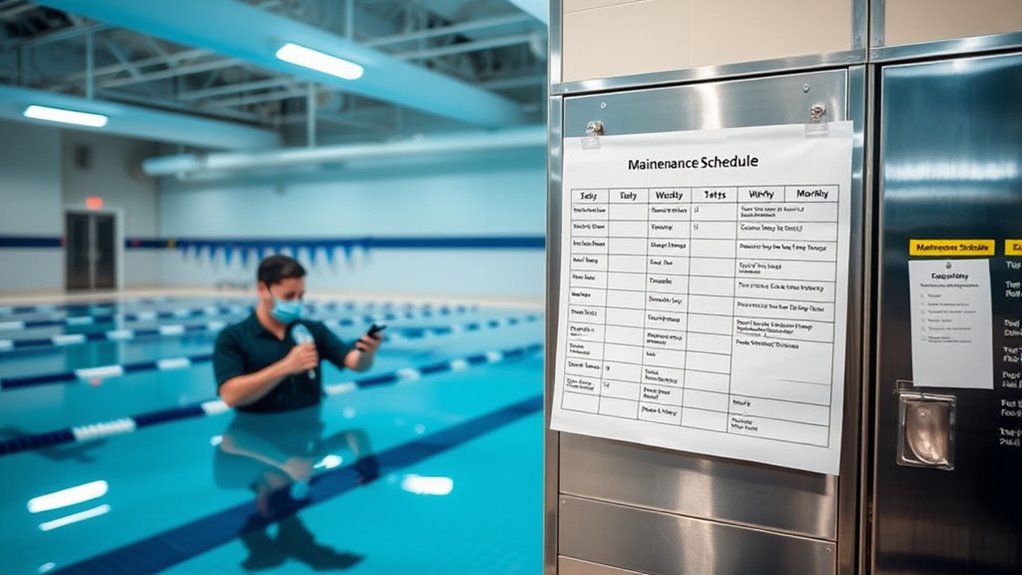
Maintaining a commercial pool requires a well-organized schedule to guarantee safety, cleanliness, and ideal operation. One of your top priorities should be routine water testing, which ensures the water chemistry remains balanced and safe for swimmers. Regularly testing the water for pH, chlorine levels, alkalinity, and other chemical parameters helps prevent issues like algae growth, bacteria buildup, and irritation. You should establish specific times during the day—preferably multiple times—to perform these tests, making sure the water remains within regulatory and safety standards. Using reliable testing kits or digital meters will give you accurate readings, enabling prompt adjustments to chemicals if needed.
Regular water testing ensures safety, balance, and prevents issues in your commercial pool.
Equally important is equipment calibration. Over time, pH sensors, chlorine analyzers, and other monitoring devices can drift from their calibrated settings, leading to inaccurate readings and potential safety hazards. Developing a routine calibration schedule ensures your equipment functions correctly and consistently. Calibration should be done at least weekly or as recommended by the manufacturer, especially after significant chemical additions or heavy usage periods. Proper calibration minimizes guesswork, allowing you to maintain ideal water quality and avoid over- or under-chlorination, which can cause skin irritation or health risks for swimmers.
Beyond water testing and equipment calibration, your schedule should incorporate daily, weekly, and monthly tasks. Daily checks might include inspecting pool skimmers, vacuuming debris, and verifying that chemical feed systems are operating correctly. Weekly tasks could involve more detailed water testing, adjusting chemical levels, cleaning filters, and inspecting pool equipment for wear or damage. Monthly maintenance should focus on deeper cleaning, inspecting pumps, heaters, and other mechanical components, and ensuring that all safety devices are functional.
Sticking to this schedule helps you catch potential problems early—like equipment malfunctions or chemical imbalances—before they escalate into safety issues or costly repairs. It also helps maintain a welcoming environment for patrons, with clear, sparkling water and a comfortable swimming experience. Consistent water testing procedures and equipment calibration are especially critical for maintaining reliable water quality, as they directly influence the safety and enjoyment of swimmers. Remember, consistency is key, and documenting your maintenance activities ensures you stay on track and have a record to reference if issues arise. By prioritizing regular water testing and equipment calibration, you’ll keep your commercial pool running smoothly, safely, and in compliance with health standards, ultimately providing a safe and enjoyable facility for every swimmer.
Frequently Asked Questions
How Often Should Chemical Levels Be Tested in Commercial Pools?
You should test chemical levels in your commercial pool at least daily to guarantee proper water balance and safety. Regular chemical testing helps you maintain ideal pH, sanitizer, and alkalinity levels, preventing harmful bacteria growth and skin irritation. During busy times or after heavy use, consider testing more frequently. Consistent testing is key to keeping your pool water safe, clear, and properly balanced for all swimmers.
What Are the Signs of Equipment Failure in Pool Systems?
You’ll notice equipment failure signs like unusual noises, inconsistent water flow, or leaks around pool systems. Equipment malfunctions often show as electrical issues or failing pumps, while leak detection reveals drips, wet spots, or pooling water near pipes and valves. Stay alert to these signs, as early detection helps prevent costly repairs and guarantees the safety of your pool area. Regular inspections are key to catching problems early.
How Do Weather Changes Affect Pool Maintenance Routines?
Weather changes, like seasonal temperature and humidity fluctuations, directly impact your pool maintenance routine. As temperatures drop or rise, you’ll need to adjust chemical levels to prevent algae growth or corrosion. Humidity fluctuations can influence evaporation rates and water loss, requiring more frequent water testing and topping off. Stay vigilant, check your equipment more often, and modify your maintenance schedule accordingly to keep the pool safe and operational year-round.
What Safety Protocols Should Staff Follow During Maintenance?
During maintenance, you should follow strict safety protocols by adhering to emergency procedures and guaranteeing staff training is up-to-date. Always wear appropriate protective gear, such as gloves and goggles, and keep emergency equipment nearby. Regularly review safety guidelines with your team, practice emergency drills, and stay alert for hazards. These steps help prevent accidents, protect staff, and ensure a safe environment for everyone using the pool.
Are There Specific Regulations for Commercial Pool Sanitation?
You’re right to wonder about regulations for commercial pool sanitation; yes, they exist. You must follow strict regulation compliance and sanitation standards set by agencies like the CDC and local health departments. These rules ensure water safety, prevent disease, and require regular testing, proper chemical levels, and filtration. Ignoring these regulations risks closures and liability. Staying informed and diligent helps keep your pool safe and compliant for everyone who swims.
Conclusion
Sticking to a solid maintenance schedule keeps your pool safe and inviting. Regular checks and timely interventions prevent bigger problems down the road, saving you time and money. Remember, a stitch in time saves nine—address issues early before they become costly repairs or safety hazards. By staying proactive, you ensure your facility remains a trusted spot for everyone to enjoy. Keep up with your routine, and you’ll always be swimming in success.
